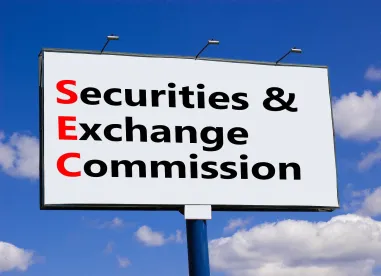The Securities Exchange Commission (SEC) adopted two new rules on June 7 aimed at preventing fraud and manipulation specific to security-based swap (SBS) transactions and the entities that trade them, including a unique rule preventing undue influence over chief compliance officers (CCOs). Because an SBS is considered a security, SBS market participants should be mindful that misconduct involving an SBS will now establish additional regulatory grounds of liability beyond the existing, broadly applicable anti-fraud rules such as Rule 10(b) and Section 17(a).
This advisory summarizes the two new rules and explains the rules’ anticipated impacts on SBS dealers’ and other SBS market participants’ existing securities and relevant compliance programs.
Rule 9j-1 – Prohibition against fraud, manipulation or deception in connection with SBS
Rule 9j-1 of the Securities Exchange Act of 1934 (Exchange Act) prohibits fraud, manipulation and deception in connection with SBS transactions. The SEC contends that the rule is necessary because, among other causes, credit default swaps led to the 2008 financial crisis, and misconduct in the SBS market similarly harms both the direct counterparties and investors in the underlying assets.
Under Rule 9j-1, the SEC must prove scienter for violations of Rule 9j-1(a)(1), (2) and (5), which prohibit, respectively, a party to an SBS knowingly or recklessly: (i) employing or attempting to employ any device, scheme or article to defraud or manipulate; (ii) making or attempting to make false statements or omissions of material fact; and (iii) attempting to obtain money or property by means of false statements or omissions of material fact, and attempting to engage in fraudulent or deceitful acts, practices or courses of business. However, only a negligence standard applies for violations of Rules 9j-1(a)(3) and (4), which prohibit, respectively, parties to an SBS transaction from: (i) obtaining money or property by means of false statements or omissions of material facts; and (ii) engaging in fraudulent or deceitful acts, practices, or courses of business. The SEC contends that this is consistent with similar anti-fraud provisions under SEC Rule 10b-5 and Section 17(a) of the Securities Act of 1933 (Securities Act) and supported by prior case law interpreting those rules. This means a firm that is a party to an SBS may be liable if it reasonably should have known that “a statement was false or misleading and directly or indirectly obtains money or property by means of such statement,” or if it reasonably should have known its actions would result in fraud or deceit on a counterparty.
Next, the rule specifically provides that market participants cannot avoid liability by effecting a fraudulent scheme through the purchase or sale of an underlying security. Notably, the rule covers the entire lifecycle of a swap, not only its initial formation. For example, the rule prohibits misconduct in connection with ongoing payments and deliveries, as well as related to the swap’s termination, assignment, exchange, transfer, or other extinguishment of rights or obligations arising from the swap.10
The Adopting Release confirms that the rule “includes prohibitions on categories of misconduct” that are likewise prohibited by the antifraud provisions in Rule 10(b) and Section 17(a) when effecting or attempting to effect SBS transactions, including making false statements and omissions, obtaining money through false statements and omissions, or using a fraudulent device or scheme.11 Notably, Rule 9j-1 diverges from the prior anti-fraud rules by including a broader definition of “purchase,” and “sale” in the text of the rule12 and adding a specific provision prohibiting manipulation or attempted manipulation of the price or valuation of an SBS.
The rule further includes two affirmative defenses against its fraud and manipulation provisions: (i) for otherwise prohibited good faith actions taken pursuant to contract, so long as the swap was entered into or amended before becoming aware of material nonpublic information; and (ii) for entities, when the individual making the investment decision at the entity was not aware of material nonpublic information and there were reasonable policies and procedures in place to prevent fraud and manipulation in swap transactions.13
Rule 15fh-4(c) – Prohibition against undue influence over CCO of SBS entity
Rule 15fh-4(c) prohibits undue influence over the CCO of an SBS dealer or major SBS participant. The rule aims to preserve the independence and objectivity of CCOs by preventing the personnel of SBS dealers or major SBS trading entities from taking actions to coerce, mislead, or otherwise interfere with the CCO. The stated goal of the rule is to support a CCO’s ability to establish and maintain policies and procedures for risk mitigation, such as trading relationship documentation, periodic reconciliation of portfolios, rigorously tested valuation methodologies, and sound collateralization practices; which in turn “support the integrity” of the swap markets.14 Examples of prohibited conduct include attempts to hide transactions, submit false valuations, or manipulate the CCO in the performance of his or her duties related to risk mitigation.15
How should companies in the swap market respond?
Although most firms are likely in general compliance with the new rules pursuant to their obligations under Rule 10(b) and Section 17(a), SBS dealers and other entities who trade SBS products should consider updating their policies and procedures to address the particular requirements of Rules 9j-1 and 15fh-4(c). In particular, policies and procedures should reflect that personnel are not permitted to use material nonpublic information related to their SBS transactions, or engage in any false statements or omission related to SBS transactions at any time during the life of the swap, including ongoing payments and deliveries and other actions beyond the purchase or sale of SBS. Similarly, policies should prohibit any price or valuation manipulation for an SBS through the underlying asset, or vice versa. Firms should take extra care in regards to policies around hedging or other legitimate market activities that could have the appearance of manipulation or fraud on SBS transactions to ensure that there is no impropriety or effect on an underlying swap. Further, as discussed above, given Rules 9j-1 and 10b5-1 have similar affirmative defenses available, firms should be able to use existing policies, though firms should ensure they have procedures specifically prohibiting conduct under Rule 9j-1.
For SBS market participants in particular, the SEC noted that they should ensure that their “legitimate market activities remain within the scope of the typical lender-borrower relationship and do not cross the line into prohibited manipulation.”16 This will likely require the institution and use of robust information barriers between lending groups and SBS traders, to the extent such walls are not already in place. Policies and procedures should inform personnel that they may take contractually required actions in good faith after receiving material nonpublic information, but only if the swap contract was entered into prior to receipt of such information. For example, standardized coupon payments and delivering or receiving collateral are permitted while aware of material nonpublic information, so long as the actions are required and documented in writing prior to receipt of the knowledge.
The rules do not require any specific documentation related to Rule 15fh-4(c), but firms should consider enhancing existing codes of ethics to identify examples of potential violations covered by the new rules. Further, firms should consider updating existing policies and procedures to require all material information to be provided to a CCO and prohibit omission of information regarding SBS transactions. Conversely, firms should be wary of CCOs taking on multiple roles, as it may be difficult to convince the SEC that there is no undue influence where the CCO has competing priorities or obligations.
Forecasting potential enforcement matters related to influencing the CCO
Rule 15fh-4(c) is unique and other securities statutes or laws governing other asset classes do not have similar provisions,17 but nonetheless prior SEC commentary on the role of the CCO is illuminating. For instance, in a 2020 speech, a Commissioner stated that CCOs should have the resources needed to implement policies and procedures, have the ability to make meaningful changes, and be included in business planning and strategy discussions from early on.18 This suggests that firms should be careful to allocate sufficient resources to their compliance department, and review any requests or guidance from CCOs carefully.
Although there have been no public enforcement actions involving influencing CCOs of swap dealers to date, prior enforcement actions against senior management related to compliance failures may be instructive. For instance, in 2015, the SEC alleged an investment adviser and its president dedicated insufficient resources for compliance by failing to provide the CCO with sufficient guidance, staff and financial resources, despite the CCO’s pleas for help.19 This allegedly contributed substantially to compliance failures at the firm, and as a result, the SEC suspended the firm’s president for 12 months from acting in a supervisory capacity and ordered him to pay a $45,000 penalty, but did not bring any charges against the CCO.20 Similarly, in 2018, the SEC brought charges against a hedge fund and its CEO because the CEO allegedly denied repeated requests from the CCO for resources to address issues related to the firm’s compliance program.21 Eventually, there were significant compliance failures that led to misstatements to investors regarding the fund’s allocation policies and due diligence practices. The SEC fined the fund $400,000 for violations of the Investment Advisers Act of 1940 and separately fined the CEO $45,000 for aiding and abetting the fund’s violations, stating that the CEO was aware of the compliance issues but did not address them sufficiently to prevent the failures.
Finally, although the rule appears focused on senior management’s actions, it is possible the SEC may use the rule to bring actions against CCOs who are unduly influenced or otherwise participate in fraud or manipulation of an SBS. There have been no such action brought against CCOs of swap dealers, but regulators have charged CCOs where the CCO participates in prohibited activity in some way, or meaningfully fail to implement compliance programs.22
1 The SEC adopted the new rules by a vote of three-to-two; the dissenting Commissioners challenged the need for new rules that “largely regurgitate language from existing antifraud rules that already apply to these products.” See Mark T. Uyeda, Statement on Rules Regarding Prohibitions Against Fraud, Manipulation, or Deception in Connection with Security-Based Swaps and Against Undue Influence Over Chief Compliance Officers (June 7, 2023), https://www.sec.gov/news/statement/uyeda-statement-rules-regarding-prohibitions-security-based-swaps-undue-influence.
2 17 CFR 240.9j-1. See Prohibition Against Fraud, Manipulation, or Deception in Connection with Security-Based Swaps; Prohibition against Undue Influence over Chief Compliance Officers, Release No. 2023-104 (June 7, 2023) (“Adopting Release”), at 1.
3 See Gary Gensler, Statement on Rule 9j-1 and Rule 15fh-4(c) (June 7, 2023), https://www.sec.gov/news/statement/gensler-statement-security-based-swaps-060723.
4 Adopting Rels., supra note 2, at 38-39, 47-48.
5 Per the negligence standard, “a defendant must act in a manner contrary to the manner in which a reasonably prudent person in the defendant’s position would have acted under the circumstances.” Adopting Rels., supra note 2, at 45.
6 Id.
7 Id. at 40 (citing Aaron v. SEC, 446 U.S. 680 (1980), as support that violations of Sections 17(a)(2) and (3) of the Securities Act, which are identical to Rules 9j-1(a)(3) and (4), could be satisfied by finding of a mental state lower than scienter). The CFTC’s companion rules – Rules 180.1 and 180.2 – also prohibit manipulative or deceptive conduct in connection with the purchase, sale, solicitation, execution, pendency or termination of a swap, including price manipulation and attempted price manipulation. Rules 180.1 and 180.2, like Rule 9 j-1, prohibit attempted conduct regarding swaps as well. Note that scienter under Rule 9j-1 includes recklessness, however under Rule 180.2 a person must act with the requisite specific intent, hence “recklessness will not suffice under final Rule 180.2 as it will under final Rule 180.1.” Adopting Rels., supra note 2, at 52.
8 Adopting Rels., supra note 2, at 39.
9 See Rules 9j-1(b) and (c).
10 Adopting Rels., supra note 2, at 100. The Adopting Release lists several examples of potential misconduct, including: (1) providing false or incomplete information to a counterparty to secure better terms or pricing, or alter performance of ongoing rights; (2) manipulation of the underlying security; (3) distorting pricing and payouts through trading software; (4) altering operation of a reference entity to benefit a swap strategy; (5) “orphaning,” avoiding termination, or causing termination of a credit default swap to benefit or harm a counterparty; and (6) engaging in wash sales to artificially inflate the price of equity securities underlying a swap to benefit the swap position. Adopting Rels., supra note 2, at 21; 56-57
11 Adopting Rels., supra note 2 at 30, 39.
12 Rule 10(b) prohibits actions in connection with only the “purchase and sale of any security” and Section 17(a) prohibits actions in just “the offer or sale of securities.”
13 While Rule 10b5-1 has a similar affirmative defense for investment decisions not based on material nonpublic information pursuant to binding contract, instructions by another person, or a written trading plan, Rule 9j-1’s defense is limited only to actions taken pursuant to binding contractual rights. The second defense for when firms have policies and procedures in place for information walls is modelled on Rule 10b5-1(c)(2) and was designed to be consistent with that rule.
14 Adopting Rels., supra note 2, at 82-83.
15 Id.
16 Adopting Rels., supra note 2 at 56.
17 Note the CFTC has rules ensuring the CCO’s independence from business trading unit personnel, but not from senior management and/or the board of directors. See CEA § 4s(k)(2)(a) and Regulation 3.3.
18 See Peter B. Driscoll, The Role of the CCO – Empowered, Senior and With Authority (Nov. 19, 2020), https://www.sec.gov/news/speech/driscoll-role-cco-2020-11-19.
19 See In the Matter of Pekin Singer Strauss Asset Mgmt. Inc., et. al., Advisers Act Rels. No. 4126, (June 23, 2015).
20 Id. at 2, 4.
21 See In re Mark A. Elste, Investment Advisers Act Rel. No. 5062. (Nov. 6, 2018).
22 See, e.g., North v. SEC, No. 18-1341 (D.C. Cir. Oct. 23, 2020).







 />i
/>i
